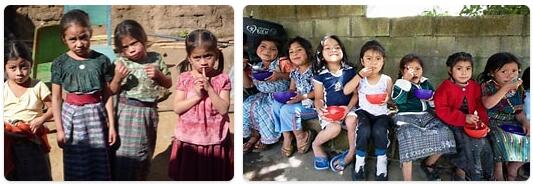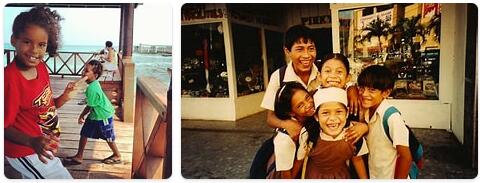Guatemala 2014
Yearbook 2014
Guatemala. Guatemala population in 2020 is estimated at 17,915,579. A ruling in the Guatemalan Constitutional Court in February brought new momentum to the debate on the legal situation in the country. The court ruled that respected prosecutor Claudia Paz y Paz’s term of office would be shortened by seven months. Paz has been seen as a key figure along with the United Nations-sponsored Commission on Impunity in Guatemala, CICIG, in the fight against impunity in the notoriously corrupt justice system. Critics felt that the decision was politically conditional and favored precisely the legal root that Paz was set to fight. Among other things, she was the leader in getting former dictator Efraín Ríos Montt convicted in May 2013 for genocide and human rights violations during her 1982–83 presidential term.

The US ambassador and several human rights organizations praised Paz’s efforts and regretted her early departure. They also criticized the appointment process for Paz’s successor, Thelma Aldana, and her connections to the ruling Patriotic Party (PP). For example, both government representatives and Congress have denied that any genocide took place during Ríos Montt.
Former President Alfonso Portillo (2000-04) in May admitted receiving bribes equivalent to $ 2.5 million and money laundering and was sentenced by a US court, where he was released a year earlier, to 70 months in prison.
In July, an agreement was reached between, among others, Guatemalan President Otto Pérez Molina and US President Barack Obama on a repatriation program for underage immigrants in the United States. About 1.8 million Guatemalans live in the United States, 60% of whom are illegal immigrants. However, many of them are covered by Obama’s decision in November to allow five million illegal immigrants to stay in the United States.
In August 2015, a court ruled to put 89-year-old former military dictator Ríos Montt on trial for genocide and crimes against humanity, but at the same time the court ruled that the case should be closed and the defendant merely represented by his defenders for the sake of his age. Amnesty International found that it was positive that the dictator was brought to justice, but that it was deeply critical that it would happen for closed doors. It merely confirmed that when justice went on a long run, the mass murderers could completely turn it around. Montt was already sentenced in 2013 to 80 years in prison, but immediately acquitted by the Constitutional Court. As of late 2016, no progress had been made in the case.
Five senior officers, including former Chief of Staff Benedicto Lucas García, were charged in 2016 with unlawful detention, torture and sexual violence against Emma Guadalupe Molina Theissen as well as the disappearance of Marco Antonio Molina Theissen. According to a number of NGOs, a number of court proceedings were interrupted and the court imposed a number of claims on the victims’ families and the public. Molina Theissen’s family was subjected to harassment and its female members subjected to sexual persecution.
High-risk court A in February 2016 handed down a landmark judgment against two former officers found guilty of the crimes against humanity, slavery and sexual violence against 11 Mayan kekchi women. The crimes took place at the military base in the city of Sepur Zarco in the 1980’s. In June, the same court ruled that eight former officers should be tried for disappearance and murder at the Creompaz military base in Alta Verapaz. Also in this case, family members of the victims were subjected to threats, surveillance and harassment, both inside and outside the court.
According to topb2bwebsites, human rights activists continue to face threats, death threats, stigma and attacks. In 2016, 16 human rights activists were killed by UDEFEGUA. The activists who fought for the environment and land were the ones who were especially exposed. They were both dragged to court by businesses and landlords, but also subject to defamation by both authorities and individuals. During the year, authorities had to drop the cases against a dozen activists who had been brought to trial to stop their human rights work.
The level of violence remained very high. Acc. UNHCR sought 11,536 Guatemalans in the period January-August 2016 asylum in neighboring countries, fleeing threats and violence.


